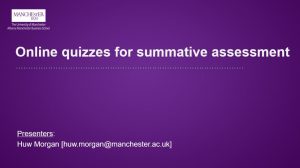Summative Quizzes and Continuous Assessment
Continuous assessment with in-built feedback allows students to utilise feedback opportunities whilst contributing to summative assessment.
This case study outlines the case for using Blackboard quizzes for continuous assessment, and the use of question pools and randomisation to avoid student collusion in summative assessment.
In BMAN10621A/B/M: Fundamentals in Financial Reporting, Huw Morgan replaced one of the assessed components of the course, a single summative mid term test worth 20% of the module marks, by a number of smaller online tests. The smaller tests were to provide students with regular feedback opportunities about their progression and in a timely fashion. Continuous assessment allows students to utilise feedback opportunities quickly whilst contributing to summative assessment.
This is Learning-oriented assessment which focuses on the learning process and:
- provides effective feedback;
- promotes student autonomy and responsibility for monitoring and managing their own learning.
Huw provides an extensive Literature Overview on Summative Quizzes and Continuous Assessment, including reference to Jisc Project on Assessment Design.
Please click the links to the right of this page to download Huw’s comprehensive slides, as well as the literature review mentioned above.
Benefits
This approach proved very beneficial for student learning in a large, diverse class where anecdotal evidence suggested a lack of student preparation before workshops.
Using Blackboard has several advantages for course leaders:
- automatic marking of most question types;
- wide range of potential question types;
- reliable recording of student answers in Grade Centre;
- detailed item analysis of individual questions.
Blackboards flexibility also allows course leaders to set up student groups to allow extra time for particular students, reliable recording of student answers in Grade Centre and detailed item analysis of individual questions.
Student Feedback
Student feedback was very positive.
I liked the fact that the assessments were split into 5 smaller tests as it reduced my workload during reading week and meant I could revise in smaller chunks for each test. [2017]
Weekly online tests are a fantastic idea to encourage constant revision of material. I feel I understand the course a lot more thanks to these. [2017]
Online tests were a nice addition, keeping me motivated to read the course material in time, rather just a few weeks before the main exam. [2018]
Top Tips
- Set time limits for each test (check with students how this works in practice);
- Provide feed-forward feedback to enable students to learn from past performance;
- Learning-oriented assessment helps to close the feedback loop, encouraging students to act on the feedback when second attempts are allowed on the tests.
eLearning Comments
Continuous assessment has a multitude of benefits for both the learner and teacher. Students often consider this mode of assessment as fairer due to the assessment usually being comprised of multiple smaller assessments instead of one larger assessment. It also allows Students to gain knowledge and build skills in layers. Students will receive feedback more regularly and can act upon it to improve their active grade within the same course unit. It also provides an opportunities for the teacher to adapt. Teacher will receive assessment data more often due to the more regular nature of the assessment. This can be used to identify any cohort trends and adapt their teaching to improve identified weaknesses.
When looking to deliver continuous assessment it is important to manage your workload. It is therefore crucial to make sure the assessment process is thought out thoroughly and the assessment delivery mode is considered carefully. The Humanities eLearning team can offer support in both of these areas. The eLearning team has a wealth of experience in supporting assessment delivery from the start to the end of the process. Get in touch with your designated school learning technologist to begin discussions. Remember, to start the process well in advance of the course unit running to achieve the most successful outcomes.
Jack Sutherst – eLearning Support Officer




0 Comments